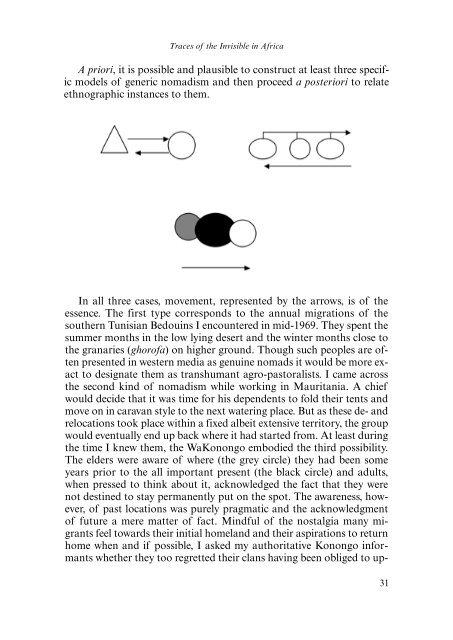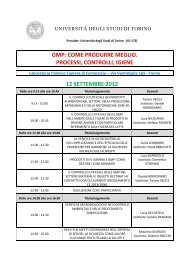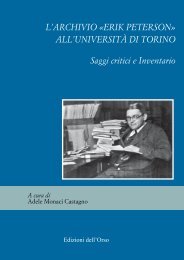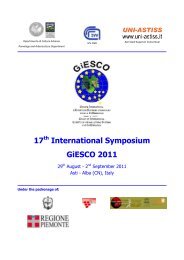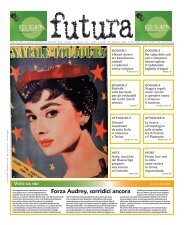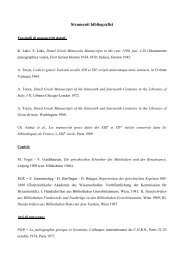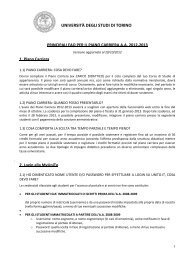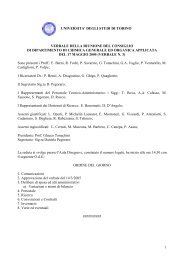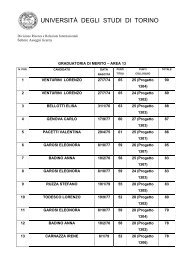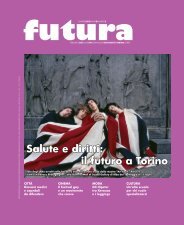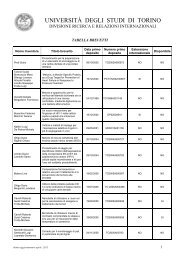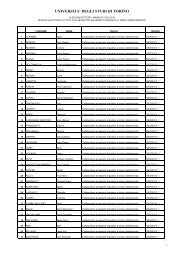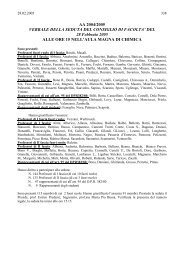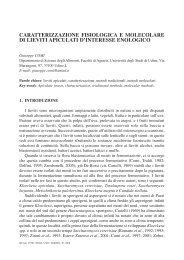- Page 2 and 3: Collana di Studi del Centro di Scie
- Page 4 and 5: Sacre impronte e oggetti «non fatt
- Page 6 and 7: Adele Monaci Castagno Presentazione
- Page 8 and 9: PRESENTAZIONE ADELE MONACI CASTAGNO
- Page 10 and 11: Presentazione mica il simbolo della
- Page 12 and 13: Presentazione La fonte studiata da
- Page 14: Presentazione done. La miniatura ri
- Page 17 and 18: 10 Michael Singleton short, subsidi
- Page 19 and 20: 12 Michael Singleton moment - each
- Page 21 and 22: 14 Michael Singleton more than the
- Page 23 and 24: 16 Michael Singleton joy any specif
- Page 25 and 26: 18 Michael Singleton On the left, s
- Page 27 and 28: 20 Michael Singleton tended meaning
- Page 29 and 30: 22 Michael Singleton ways of tracin
- Page 31 and 32: 24 Michael Singleton same immaculat
- Page 33 and 34: 26 Michael Singleton of almost ever
- Page 35 and 36: 28 Michael Singleton dha, Quo Vadis
- Page 37: 30 Michael Singleton quite differen
- Page 41 and 42: 34 Michael Singleton situation as o
- Page 43 and 44: 36 Michael Singleton male and femal
- Page 45 and 46: 38 Michael Singleton by some invisi
- Page 48 and 49: COSE DI UN ALTRO MONDO: OGGETTI SAC
- Page 50 and 51: Cose di un altro mondo Cheyenne Riv
- Page 52 and 53: Cose di un altro mondo vuto dal Cre
- Page 54 and 55: Cose di un altro mondo Questa carat
- Page 56 and 57: Cose di un altro mondo dalità con
- Page 58 and 59: Cose di un altro mondo tere solare
- Page 60 and 61: Cose di un altro mondo cui si pongo
- Page 62 and 63: Cose di un altro mondo sem bra che
- Page 64 and 65: Cose di un altro mondo sponsabile d
- Page 66 and 67: Cose di un altro mondo Il nipote di
- Page 68 and 69: Cose di un altro mondo in cerchio,
- Page 70 and 71: SU ALCUNI OGGETTI ACHIROPITI DELLA
- Page 72 and 73: Su alcuni oggetti achiropiti della
- Page 74 and 75: Su alcuni oggetti achiropiti della
- Page 76 and 77: Su alcuni oggetti achiropiti della
- Page 78 and 79: LA PIETRA NERA E IL CULTO DELLA KA
- Page 80 and 81: La Pietra Nera e il culto della Ka
- Page 82 and 83: 2. Muhammad e la Pietra Nera La Pie
- Page 84 and 85: La Pietra Nera e il culto della Ka
- Page 86 and 87: La Pietra Nera e il culto della Ka
- Page 88 and 89:
IMPRONTE, RITRATTI E RELIQUIE DI PR
- Page 90 and 91:
Impronte, ritratti e reliquie di pr
- Page 92 and 93:
Impronte, ritratti e reliquie di pr
- Page 94 and 95:
Impronte, ritratti e reliquie di pr
- Page 96 and 97:
Impronte, ritratti e reliquie di pr
- Page 98 and 99:
Impronte, ritratti e reliquie di pr
- Page 100 and 101:
Impronte, ritratti e reliquie di pr
- Page 102 and 103:
OGGETTI ‘CADUTI DAL CIELO’ NEL
- Page 104 and 105:
Oggetti ‘caduti dal cielo’ nel
- Page 106 and 107:
Oggetti ‘caduti dal cielo’ nel
- Page 108 and 109:
Oggetti ‘caduti dal cielo’ nel
- Page 110 and 111:
Oggetti ‘caduti dal cielo’ nel
- Page 112 and 113:
Oggetti ‘caduti dal cielo’ nel
- Page 114 and 115:
Oggetti ‘caduti dal cielo’ nel
- Page 116 and 117:
Oggetti ‘caduti dal cielo’ nel
- Page 118:
Oggetti ‘caduti dal cielo’ nel
- Page 121 and 122:
114 Graziano Lingua un primo orient
- Page 123 and 124:
116 Graziano Lingua ché, se così
- Page 125 and 126:
118 Graziano Lingua genda faceva ri
- Page 127 and 128:
120 Graziano Lingua luppa a giustif
- Page 129 and 130:
122 Graziano Lingua Teodoro Studita
- Page 131 and 132:
124 Graziano Lingua siderare che gi
- Page 133 and 134:
126 Graziano Lingua solo all’inte
- Page 135 and 136:
128 Graziano Lingua sanguineo rigat
- Page 137 and 138:
130 Anca Vasiliu par la pérennisat
- Page 139 and 140:
132 Anca Vasiliu d’un être singu
- Page 141 and 142:
134 Anca Vasiliu Plotin, chez qui c
- Page 143 and 144:
136 Anca Vasiliu table superpositio
- Page 145 and 146:
138 Anca Vasiliu Nous savons, par a
- Page 147 and 148:
140 Anca Vasiliu que ceux de la vie
- Page 149 and 150:
142 Anca Vasiliu L’empreinte néc
- Page 151 and 152:
144 Anca Vasiliu trois significatio
- Page 153 and 154:
146 Anca Vasiliu ou l’impression
- Page 155 and 156:
148 Anca Vasiliu On comprend alors
- Page 157 and 158:
150 Anca Vasiliu 4. Corps et visage
- Page 160:
Tavole
- Page 163 and 164:
Tav. 3: Śālagrāma. Tav. 4: Rocci
- Page 165 and 166:
Tav. 6: Impronta del profeta Muḥa
- Page 167 and 168:
Tav. 10: Impronte rocciose dei pied
- Page 169 and 170:
Tav. 13: Disegno della Rotonda dell
- Page 171 and 172:
Tav. 17: Monza, Tesoro del Duomo, a
- Page 173 and 174:
Tav. 21: Roma, Seminario Romano, Co
- Page 175 and 176:
Tav. 25: Mandilio. Affresco della c
- Page 177 and 178:
Tav. 30: Incisione del 1649 raffigu
- Page 179 and 180:
154 Luigi Canetti sorta di collisio
- Page 181 and 182:
156 Luigi Canetti personaggi della
- Page 183 and 184:
158 Luigi Canetti strutturato e pla
- Page 185 and 186:
160 Luigi Canetti misteriosi eventi
- Page 187 and 188:
162 Luigi Canetti gnore 35 , non as
- Page 189 and 190:
164 Luigi Canetti ibi est spelunca
- Page 191 and 192:
166 Luigi Canetti tonda dell’Asce
- Page 193 and 194:
168 Luigi Canetti tempo forse ancor
- Page 195 and 196:
170 Luigi Canetti faceva dell’iro
- Page 197 and 198:
172 Luigi Canetti scovo di Gerusale
- Page 199 and 200:
174 Luigi Canetti Le attestazioni p
- Page 201 and 202:
176 Luigi Canetti latino fino all
- Page 203 and 204:
178 Luigi Canetti niera così progr
- Page 206 and 207:
L’IMMAGINE ACHEROPITA DI S. STEFA
- Page 208 and 209:
L’immagine acheropita di S. Stefa
- Page 210 and 211:
L’immagine acheropita di S. Stefa
- Page 212 and 213:
L’immagine acheropita di S. Stefa
- Page 214 and 215:
L’immagine acheropita di S. Stefa
- Page 216 and 217:
L’immagine acheropita di S. Stefa
- Page 218 and 219:
L’immagine acheropita di S. Stefa
- Page 220 and 221:
L’immagine acheropita di S. Stefa
- Page 222 and 223:
L’immagine acheropita di S. Stefa
- Page 224:
L’immagine acheropita di S. Stefa
- Page 227 and 228:
202 Ester Brunet to dallo statuto d
- Page 229 and 230:
204 Ester Brunet non fosse poi cos
- Page 231 and 232:
206 Ester Brunet prospettico della
- Page 233 and 234:
208 Ester Brunet della funzione che
- Page 235 and 236:
210 Ester Brunet termine soltanto i
- Page 237 and 238:
212 Ester Brunet Roma-Bisanzio, ag
- Page 239 and 240:
214 Ester Brunet Studiosi come Jean
- Page 241 and 242:
216 Ester Brunet teologicamente att
- Page 243 and 244:
218 Ester Brunet Il testo della sin
- Page 245 and 246:
220 Ester Brunet ce il papa citando
- Page 247 and 248:
222 Ester Brunet avendo compendiato
- Page 249 and 250:
224 Ester Brunet ropita, implicando
- Page 251 and 252:
226 Ester Brunet adoriamo tutto ci
- Page 253 and 254:
228 Ester Brunet culto delle immagi
- Page 255 and 256:
230 Ester Brunet proficuamente su c
- Page 257 and 258:
232 Rémi Gounelle La présente con
- Page 259 and 260:
234 Rémi Gounelle indication de te
- Page 261 and 262:
236 Rémi Gounelle était dans la c
- Page 263 and 264:
238 Rémi Gounelle tique satisfaisa
- Page 265 and 266:
240 Rémi Gounelle règne de Tibèr
- Page 267 and 268:
242 Rémi Gounelle une des sources
- Page 269 and 270:
244 Rémi Gounelle la Vindicta Salv
- Page 271 and 272:
2.3. Analyse 246 Rémi Gounelle Pou
- Page 273 and 274:
248 Rémi Gounelle Quoi qu’il en
- Page 275 and 276:
250 Rémi Gounelle complexe et insu
- Page 278 and 279:
L’IMAGE D’ÉDESSE, ROMAIN ET CO
- Page 280 and 281:
L’image d’Édesse, Romain et Co
- Page 282 and 283:
L’image d’Édesse, Romain et Co
- Page 284 and 285:
L’image d’Édesse, Romain et Co
- Page 286 and 287:
L’image d’Édesse, Romain et Co
- Page 288 and 289:
L’image d’Édesse, Romain et Co
- Page 290 and 291:
L’image d’Édesse, Romain et Co
- Page 292 and 293:
L’image d’Édesse, Romain et Co
- Page 294 and 295:
L’image d’Édesse, Romain et Co
- Page 296 and 297:
L’image d’Édesse, Romain et Co
- Page 298 and 299:
L’image d’Édesse, Romain et Co
- Page 300 and 301:
L’image d’Édesse, Romain et Co
- Page 302:
L’image d’Édesse, Romain et Co
- Page 305 and 306:
280 Andrea Nicolotti un preciso ed
- Page 307 and 308:
282 Andrea Nicolotti Sindone è un
- Page 309 and 310:
284 Andrea Nicolotti stenza di un r
- Page 311 and 312:
286 Andrea Nicolotti Abgar aveva or
- Page 313 and 314:
288 Andrea Nicolotti sola natura di
- Page 315 and 316:
290 Andrea Nicolotti vista, però,
- Page 317 and 318:
3. Gregorio il Referendario 292 And
- Page 319 and 320:
294 Andrea Nicolotti interpretazion
- Page 321 and 322:
296 Andrea Nicolotti e Gesù lo acc
- Page 323 and 324:
298 Andrea Nicolotti cronache illus
- Page 325 and 326:
300 Andrea Nicolotti ti che riconob
- Page 327 and 328:
302 Andrea Nicolotti La chiesa del
- Page 329 and 330:
304 Andrea Nicolotti Tra le reliqui
- Page 331 and 332:
306 Andrea Nicolotti Arnold von Har
- Page 334 and 335:
DALLE ACHEROPITE ALLA SINDONE GIAN
- Page 336 and 337:
Dalle acheropite alla Sindone Indag
- Page 338 and 339:
Dalle acheropite alla Sindone un le
- Page 340 and 341:
Dalle acheropite alla Sindone vale
- Page 342 and 343:
Dalle acheropite alla Sindone Crist
- Page 344 and 345:
Dalle acheropite alla Sindone d’O
- Page 346 and 347:
Dalle acheropite alla Sindone Le re
- Page 348 and 349:
Dalle acheropite alla Sindone anche


